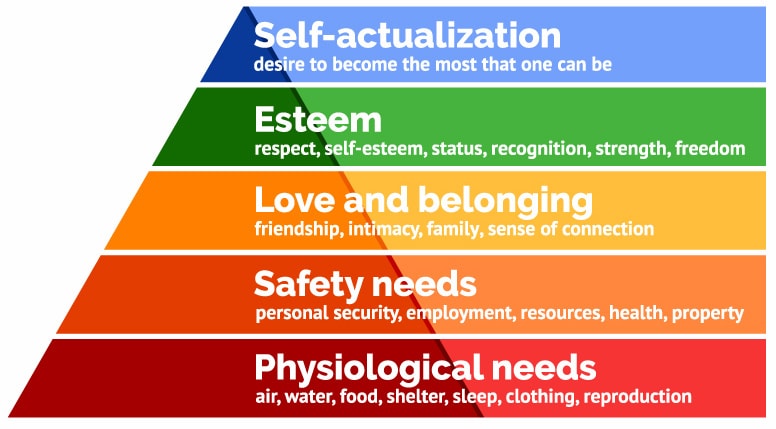Generally people tend to use these three words - Needs, Wants and Demands - interchangably. But not marketers. You, as a marketer, need to be aware of the big difference that there is between these three terms.
In the previous chapter, I shared with you about what is Marketing. And there, you would have understood that marketing is about solving a problem and satisfying a need. So in this chapter, let me take you further into what is a Need, Want and Demand.
I have created a detailed video for you to help you understand what are Needs, Wants and Demands in a better manner.
To understand Needs, Wants and Demands better, let me take you through my MBA story. You will know why I am sharing it in just a bit ????
Needs, Wants and Demands
I am an awful engineer. And here’s the thing about higher education.
Apart from employment, higher education gives you a sense of fulfillment and positive self-esteem through the knowledge you get about your subjects.
In my case, it only gave me employment and nothing much on the self-esteem front.
I had a need for better self-esteem, status, and recognition. I had to find a way to satisfy this need of mine, which engineering, clearly, couldn’t satisfy.
There were a few options to choose from for pursuing masters. These were the common culprits – M.Tech, MS, and MBA. At that point in time, just after having been brutalized by technology studies, I was clear that I want to do MBA.
I took the Common Admission Test (CAT) and there was I, shortlisted for the interviews of almost all the top B-schools of India, including the IIMs, XLRI, IIFT, and a few others.
I was keen on getting into one of the top IIMs for some really good reasons that I had. And with those 10,000+ candidates who were shortlisted for the interview,
I knew that the competition for those 5000 odd seats is going to be tough as the demand was high!
If you skipped reading all that self-loathing of mine, you should land up here.
Now, while there is a clear difference between what Needs, Wants and Demands mean, it is common for people to use them interchangeably.
In fact, I used it interchangeably in the previous chapter that you read.
But now once you read below, you will understand the real difference between Needs and Wants. And also about what is Demand.
What are Needs?
The word 'Need' is often used loosely even when you or the author is actually trying to refer to a want. But you as a marketer have to know the exact difference. So, here it is in the simplest way I can explain it to.
An extremely simple to comprehend the definition of need is the deprivation of something.
Needs are some innate basic human requirements that are common across all the individuals. Needs are as basic as air, water, food, shelter, confidence, and self-esteem. These are needs because of their necessity for our survival and sustainability.
They are a part of the fundamental human packaging, we as humans are programmed that way.
Maslow’s Hierarchy of Needs puts together all the needs in the form of a hierarchical pyramid. The bottom-most ones in the pyramid that are the most essential for survival.

Source: https://www.simplypsychology.org/maslow.html
The ones at the tops are more self-fulfilling and you usually have them activated only when some of the basic needs are fulfilled.
As you move up the pyramid, the needs become less important for survival but more important for the maximization of the human potential.
This also implies that for a human being, unless one of the bottom (and the more essential) needs are not fulfilled, it is unlikely that the person will pursue any higher need.
For example: If there is a financial crisis in the household, the limited money that they have would be utilized to ensure food, water and shelter. It is unlikely that the first thought is going to be education or self-actualization.
On the other hand, for us, MBAs, because our essential needs have been taken care off, we have the mind space to think about maximizing our potential and also have the ability to deploy the resources to achieve that.
What are Wants?
Here is when you will understand the difference between Needs and Wants.
A need becomes a want when you identify a specific object that may satisfy that need of yours.
For someone who has a need for traveling from her home to her workplace to earn her bread, buying an expensive car is a want. Out of all the options like scooters, bike, public transport, she feels that a car can satisfy this need the best and that’s why she wants it.
What are Demands?
But the harsh reality of life is, she may want to buy a car but she may not necessarily have the money to by one right now. She has enough to spare for a new good Honda Scooter and therefore, initiates her pursuit to buy a Honda scooter.
So while she wanted a car, she became a part of the demand that there is for a Honda scooter.
What this means is that demand is a want for a specific product only if it is backed by an ability to pay for it.
And that’s what marketers do right? Assess the demand for their product and determine how much market can they realistically capture, because these are the people who have the pockets to pay for the product.
Remember, demand is always related to a specific product.
Do marketers create needs?
Marketers profit, marketers prospers because people buy what they want and not what they need.
People across India need healthy hair. For this need, a person in a rural area would want a simple hair oil while a woman in an urban city might want something that’s not as sticky as hair oil. So, therefore, probably a serum
So that’s one need and two different wants.
The fact is marketers can, at best, validate and understand needs. Marketers can’t create needs.
Whereas marketers can create wants. Marketers are not only supposed to identify, anticipate and create wants – it is your job as a marketer to intensify these wants.
And what do you after identifying the needs and wants?
You split your audience as per their differing needs and wants. And this is exactly what is called Segmentation.
For example, just as I mentioned above, a person in the rural area would want a simple hair oil while a woman in an urban city might want a serum. They are two different 'segments' of customers and you would want to 'target' them differently, i.e., with different communication and even with different products.
Let's learn more about Segmentation, Targeting and Positioning in the next chapter.

